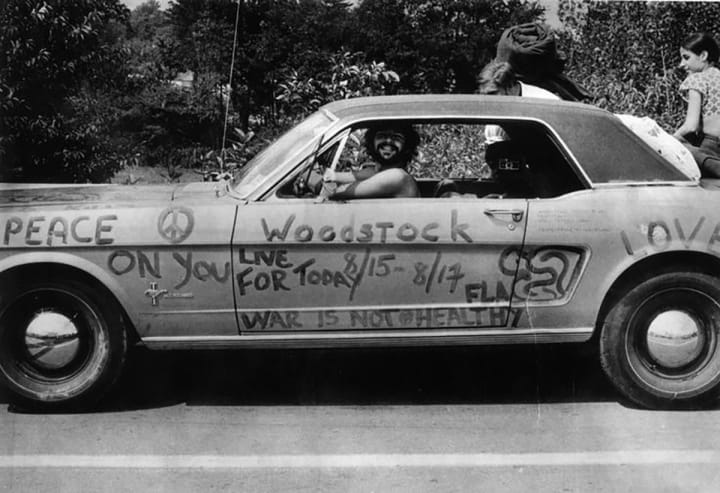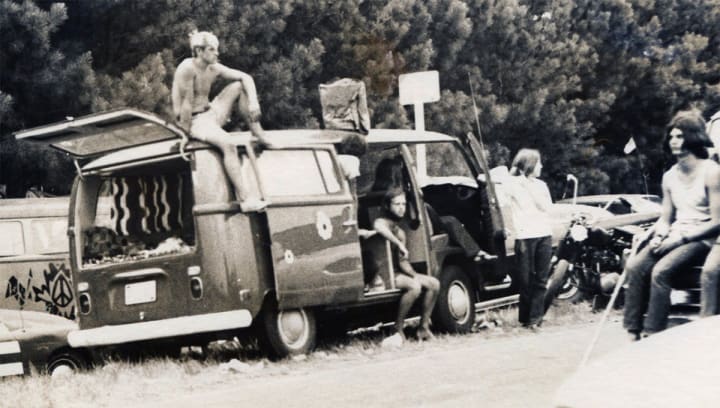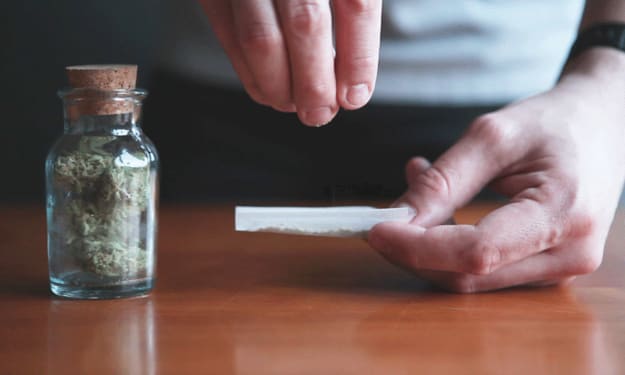Is Driving High Dangerous?
Of course driving high is dangerous, but is it as dangerous as driving drunk?

Is driving under the influence of marijuana dangerous? Is the stoned driver, like the drunken driver, a menace on the highway, sitting behind the wheel of an automobile that he cannot reasonably control? If you already smoke marijuana on social occasions, you may have assured that many tests over years of study have not been able to demonstrate that marijuana has anything like the effect of alcohol on driving performance. In terms of reaction time, steering and braking errors, and other standards used in a number of tests, social marijuana users performed almost as well as the control groups, while those given alcohol, persistently had poorer scores.
On the other hand, if you are a social marijuana smoker, the chances are unlikely that you'll ever have the chance to show off. There is no question that marijuana has a dramatic effect on various types of mental activity. Those millions of "social smokers" aren't all puffing on placebos; They're getting something out of it. There are many obvious physical effects as well: increased heartbeat, constriction of capillaries, a drying of the mouth and eyes. To have something this persuasive occur and still find practically no effects on driving performance is unsettling to the scientific mind.

Photo via Billboard
Learning the Cause and Effect
Several recent experiments are interesting, if only to show the lengths to which researchers will go to try to get something to deviate from normal “significantly” enough to be worth publishing. How would you like to be dosed with 450 micrograms of pure clinical THC by a team of inquisitive doctors and asked to try your hand at the wheel? Or, during your first or second experience with marijuana, find that you had to negotiate through traffic in Montreal with a curious psychologist as your front seat companion? Before you get set to yell fix!, it might make you feel a bit better to know that the great majority of medical doctors do not place much credence in the sort of tests we just mentioned. On the other hand, most websites and magazine publishers aren't trained to pick up the errors in either design or interpretation of a study which would have serious implications on its validity, so every now and again a juicy story will hit the press about the “dangers" of driving after smoking. The facts remain the same: normal drivers drive normally under normal doses of smoked marijuana. And studies prove just as conclusively that normal drivers do not drive normally under normal doses of alcohol. They just think they do.
The studies of driving under the effects of marijuana are instructive in a very important area. There is always a tendency to compare an unknown against a known; in this case the testing of one social drug against the known effects of another. It doesn't matter that THC is dramatically different from alcohol; people get intoxicated by it and therefore it must do something at least to some extent that could impair ones ability. The obvious route to take is to zero in on the harmful effects that people get from other drugs, and then see if marijuana can be coaxed into being guilty of the same crimes. Sometimes the coaxing begins to look like the ritual torture of statistics to try to prove a point, but bureaucracies are, after all, the stabilizers of the system. Professional, legal, scientific, governmental; it is expected that these groups will save us from madmen and wizards by thorough and careful tests designed to frustrate to death all but the most legitimate of new beliefs. The researchers may have biases as thick as elephant hide, but the numbers come through intact no matter how they are interpreted; if a truth cannot be altered by a succession of attacks, then the scientific community begins to adjust itself to accommodate the new views.
The only thing about studies involving marijuana and driving is that it becomes repetitious after awhile—the same results keep appearing. Marijuana is not at all like alcohol. Alcohol is bad for driving because of things it does to the brain which marijuana cannot do to the brain. The only way you can get marijuana to approach the danger of alcohol, apparently, is to get the volunteer so totally wrecked that only a madman would attempt to drive. Then, yes, it is dangerous. But all that proves is that you can, under rare circumstances, get a person to risk his life for science. The real problem is that we each have very unique reactions, and there is no question that there are some who can show 0 impact, and there are others that in the exact same circumstance will. This is why the laws against driving while under the influence of marijuana must be followed for your own safety and fellow drivers as well.

Image via WeHeartIt
This is Your Brain on Drugs
One thing which did turn up as well was the fact that although the brain-fried volunteer was having trouble keeping his mind on the road, he was usually very vocal about how stoned he was. Most of those drunks weaving about on the roads are sure that they're doing just fine, and therein is the real clue to those tests.
Most automobile accidents occur, it seems, from the inability of the brain to process important information fast enough. Alcohol is a depressant which acts on practically all the brain centers, the higher ones as well as the lower ones. Marijuana, on the other hand, has a tendency to act like a stimulant, especially on the higher brain centers. And driving is to most people, an almost semi-automatic function. Since people drive pretty automatically, avoiding an accident can be divided into two parts: becoming aware of the danger and responding to it. Something has to be out of the ordinary enough to snap you into emergency action, and your nerves and muscles have to act fast enough to do whatever it is that has to be done. Picking up what is happening is a higher brain function, especially when it comes to sorting out the important from the unimportant. Nerve and muscle response is handled by lower brain centers.
After you have been driving awhile, you find that you can listen intently to Spotify and still drive perfectly well. The speed-up, slow-down responses are almost automatic—passing other cars, stopping for traffic signals, etc. You don't consciously figure out what to do in sequence; it's all carried out in a semiconscious manner, the same as putting on your clothes. A depressant drug like alcohol makes putting on your clothes pretty difficult at times. Your sloshy mind has good intentions, but your feet seem to go the wrong way. Getting dressed doesn’t require a lot of effort anyway, so you don't notice how fuzzy your thinking is. But you do notice how fuzzy your muscles are acting.
The same thing happens to the drunk driver: driving is so automatic that, since he never paid that much mind to it, he is able to coast along on one burner just fine. If anything happens which requires quick thinking, he's in trouble. Now that he needs his whole brain in action, it's half asleep. By the time his foot hits the brake, the car has often hit the tree. The problem is that after you get used to driving, you never think of it as being terribly difficult. Your reaction time is noticeably reduced after just a few drinks, but since driving is such an easy job you feel up to the task. Your inhibitions are also asleep and if you ever had doubts about your driving ability, they left after that last Tequila Sunrise. And that is the double hazard of alcohol. It slows down your reaction time, which is bad, but it also impairs your judgment, which is worse. Not only can't you drive that well, but you are unaware of it.

Image via Pinterest user Hope Robinson
Heightened Senses
With marijuana, the situation is reversed at the higher brain levels. Instead of being sedated, your attention is stimulated. Of course, once again the issue with weed is different people respond differently to heightened stimulation. Thus, better to be safe than sorry when deciding on taking a ride in your stoned friends SUV. You focus in on everything. Your reaction time itself is not really affected in terms of nerve and muscle speed, but your attention and excitement level is considerably higher. This effect was tested in an interesting study in which volunteers were placed before a screen. A star was flashed on the screen, and exactly one second later a tone was sounded. The idea was to push a button as fast as possible to stop the tone. By taping electrodes to the scalp, the scientists studied the “CNV” effect. This CNV effect measured the amount of anticipation or excitement caused by some sort of stimulation. Alcohol caused a lower CNV effect, and a slower reaction. The actual reaction time under marijuana was about the same as the “no drug” volunteers, but the CNV effect was much higher. The subject knew that the tone was going to come one second after the star. When he was stoned, he really flashed on it when it appeared and hit the button as fast as he could. The muscle reaction time was the same as it would have been if he had been straight, but the mental reaction was significantly greater.
Again, driving is a semi-automatic function to the experienced driver. When that driver is stoned, however, he is paying exquisite attention to all sorts of things: mental nuances, the feel of the steering wheel, the glint of the sun on the leaves. For some, at the expense of oncoming traffic. The normal actions and reactions of driving are, as usual, being carried out in that almost mindless fashion, but with one big difference—if something out of the ordinary does happen, the stoned driver will flash on it immediately and hope his muscle-reaction time is just fine. But that out of the ordinary event leave no room for error. The biggest difference is really in the stoned driver's head. Since he is used to chugging mindlessly down the highway, daydreaming about this or that, the attention he gives things while stoned may make him feel that he is not paying enough attention to the wheel.
This leads to the next conclusion about driving when stoned: most people are quite aware of the state of their head when they are wrecked and in most cases are not at all happy about getting into a car and driving somewhere. One of the most biased marijuana-and-driving studies we have seen made this observation: “Two drivers experienced in the use of marijuana were observed while ‘super stoned' on approximately three joints of potents Jamaican marijuana. Each was able to attest to the fact that he was heavily under the influence of the marijuana based upon his past experiences. The first driver, a 24-year-old male, noted definite intermittent lack of concentration on driving. Although the driver was well aware of the problems of safe vehicle control and drove slowly, he tended to weave in his lane....”.

Photo via Salon
Self-Aware Stoners
The authors of the study had already put themselves on line as being against decriminalization, and had appeared honestly shocked and surprised that almost one fifth of those answering an anonymous questionnaire used marijuana daily. This, they assumed, meant that these people were “stoned much of the time” and they hastened to add “This in no way reflects the prevalence of such abuse...” Expecting the very worst, they let the volunteer go through three straight joints of top quality weed and hopped in the car with him, probably quaking with fear. They knew he was stoned. He knew he was stoned. It would be rather obvious. And yet, aware of his condition, the driver drove slowly. He did weave a bit, but slowly and in his own lane. Still not the position you want to be in. A drunk driver is usually blissfully unaware of his inability to cope with the responsibilities of safe vehicle control until he has already sailed off the road, usually at a pretty good clip. The stoned driver knows he's stoned, so he either doesn't drive at all, or modifies his driving habits to be especially careful.
This amplified awareness which causes marijuana smokers generally to avoid driving when they're totally wrecked has resulted in a couple of humorous tales which have been scientifically verified. The story usually goes that the freak is traveling down the highway when the cop pulls him over. “All right, buster, how fast did you think you were going?” “I dunno, officer,” smiles the chastened pot smoker, “65, 70?” “You were going 15 miles an hour,” roars the cop. “Now get your ass in gear and get a move on!”
Practice Makes Perfect
A study done by Dr. Alfred Crancer and his associates reported “The effects of driving on marijuana, alcohol, and no (drugs) were determined for experienced marijuana smokers. Subjects experiencing a ‘social marihuana high' accumulated significantly more speedometer errors than under control conditions, whereas there were no significant differences in accelerator, brake, signal, steering, and total errors. The same subjects intoxicated from alcohol accumulated significantly more accelerator, brake, signal, speedometer, and total errors than under normal (control) conditions.” It seems that you can even test that old joke. Marijuana smokers drive normally; they just think they’re going faster than they are. As a result, as the previous team reported, they tend to slow down.
There are conditions, of course, when marijuana would make things difficult. The two examples mentioned at the beginning of this article demonstrate situations in which driving was definitely impaired. Of course, the situations were rather unusual. In the first case subjects were given oral doses of THC large enough to cause serious problems lasting as long as 24 hours. The closest most people could come to that would be to wolf down about six hash brownies. We’re not talking about “social smoking” any more, we're talking about “acute toxic drug effects.” Interesting for an experiment, but not often found in the real world. The other study, performed at McGill University, determined that a marijuana-naive subject had considerable trouble driving in traffic. Of course, the marijuana naive person usually doesn’t do much of anything the first five or ten times he's high. The study doesn't indicate how much they were paying volunteers this time, but it must have been a bundle. Rush hour traffic in Montreal is no fun straight, it's worse stoned.
The first couple of times trying marijuana must have been a real horror show for the poor volunteer. He'll never smoke marijuana again. One of the reasons that seems to prevent marijuana smokers from getting into accidents is that their very awareness of their situation prevents them from driving “aggressively.” Dr. A.B. Dott set up a driving simulator and tested volunteers who had smoked marijuana. His marijuana subjects were reluctant to pass another car, took longer to make decisions, and had no more accidents than the “normal” subjects. Despite their lack of accidents, in a questionnaire, most replied that they considered it unsafe to drive while stoned, although they had all done it at one time or another. Dott was unsure as to whether his marijuana subjects were demonstrating a drug-induced lack of “willingness to take risk” or whether they were simply consciously aware that they were stoned and were, accordingly, more careful.
It is very difficult for one establishment to publicly refute another. Bearing in mind that almost half the drivers in fatal automobile accidents had been drinking, it would be natural for the government to fund research to determine whether one could expect the same from marijuana. The difficulty of detecting marijuana in the bloodstream made these tests even more important. There would be no way, after the fact, to discover whether the driver in a fatal accident had been smoking marijuana. The studies were all done honestly and in most cases without bias. Usually, they were trying to see if marijuana could be considered a dangerous drug for drivers to use. What turned up over and over was that, although marijuana smokers continually proved that they were not straight in tests involving attention and concentration, they nonetheless seemed almost unaffected by the drug when it came to driving safety. What was even more surprising, and most smoker tended to be very aware of his being “high” and unlike the behavior of the drinking driver, the marijuana either actively compensated for it, or was reluctant to drive at all.

Photo via PETA
Slow Doesn’t Always Equal Steady
These results are hardly going to help win federal legalization. Although pot didn't affect reaction time, it did create a mass of paranoid drivers, consciously cautious and often unwilling to drive until they felt able to cope with the situation, keeping under the speed limit, nervously glancing at the speedometer, afraid to pass other cars. It sounds like just the thing to give those semiconscious over-confident smokers to keep them from driving like they were at NASCAR. When it comes to government-sponsored research on marijuana, if you can't say something bad about it, don't say anything at all. Just record the findings, sound a little negative, and ask for some more funds for another study. A perfect example of this sort of conclusion, are the findings of Dr. Fred Benjamin of the Department of Transportation:
“Preliminary evidence indicates that marijuana impairs the ability to drive. However, marijuana apparently is not a significant factor in the statistical incidence of fatal and non-fatal accidents. These two observations, if combined, indicate that either the marijuana smoker is conscious of his impairment and avoids driving, or that he manages to compensate for the deficiency, at least to some extent. These are tentative findings, and considerable work is required to establish more reliable data.”
That is a gem of scientific doubletalk. What it translates to is “marijuana ought to be dangerous, but damned if we can find anyone getting into accidents, even small ones. If you put those two together, it means that either those guys aren't driving at all, because they know they're stoned, or they can drive O.K. when they are stoned. At any rate, let's run another study.” And so it goes.
Don't Compare Apples to Oranges
One word of caution: marijuana is a considerably less powerful drug than alcohol. If you’re going to tie one on or just have a few beers, there's no way that dope is going to wake you up and make you drive better. Quite the contrary, a stoned drunk is even worse than a regular drunk. The alcohol takes over the whole brain and tramples right over the dope. If you drive, don't drink. If you drink, don't drive. That's known by all and practiced by too few. We all know the tragic results. But at least it seems that marijuana isn't to blame for highway idiocy. Although this information may be slow in becoming popular with the Department of Transportation, the doctors themselves have read the research. In a study by Dr. Jonathan Lieff of the Harvard Medical School, physicians were given an attitude questionnaire comparing drugs in five major categories. The majority of the responding doctors indicated that they felt marijuana to be less harmful than alcohol in all five categories, less harmful than cigarettes in three of the five. Studies will continue to come out, and they will continue to be very quiet and very conservative. That's the legitimate, scientific approach. Nobody's going to recommend marijuana, but in a leading laboratory test, doctors agree that the ingredients in marijuana are less harmful to your health than those found in alcohol. Especially when it comes to driving.
About the Creator
Hydro Wilson
Of Alpha Kappa Nu fame. Grew up in Boulder, Colorado. Addicted to Halo.






Comments
There are no comments for this story
Be the first to respond and start the conversation.